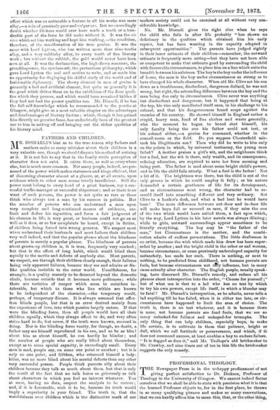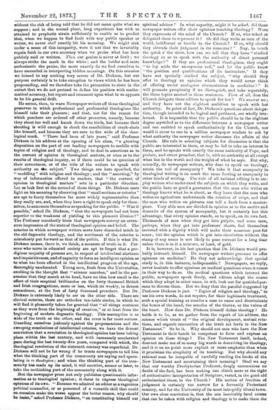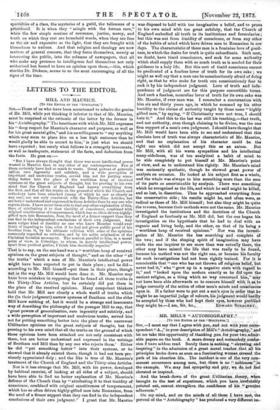PROFESSIONAL THEOLOGY.
THE Newspaper Press is in the unhappy predicament of not giving perfect satisfaction to Dr. Dickson, Professor of Theology in the University of Glasgow. We cannot indeed flatter ourselves that we shall be able to state with precision what it is that the learned Professor objects to, for in the first place, he throws in so many qualifying phrases and makes so many reservations, that we can hardly affirm him to mean this, that, or the other thing, without the risk of being told that he did not mean quite what we I suppose ; and in the second place, long experience has with us attained to prophetic strain sufficiently to enable us to predict that, when we happen to find fault with any public speaker or writer, we never shall exactly hit his meaning. We might sink under a sense of this incapacity, were it not that we invariably regain faith in our own accuracy when we praise what has been publicly said or written. Then our genius is never at fault ; we always strike the mark in the white ; and the bolder and more enthusiastic the praise, the more exactly do we find ourselves to have succeeded in interpreting hidden meanings. On this occasion we intend to say nothing very severe of Dr. Dickson, but our purpose certainly is to take exception to views which he has been propounding, and we therefore take the precaution to state in the outset that we do not pretend to define his position with mathe- matical accuracy, but report and comment upon what to us appears to be his general drift.
He seems, then, to warn Newspaper writers off those theological preserves in which professional and professorial theologians like himself take their pleasure ; and that, not for the reason for which poachers are ordered off other preserves, namely, because they shoot too well and knock down the birds, but because their shooting is wild enough to shock the sensibilities of crack-shots like himself, and because they are sure to fire wide of the theo- logical mark. " There had been of late years," said Professor Dickson in his address at the opening of his class, " a growing disposition on the part of our leading newspapers to meddle with topics of religion and of theology, and to deal in assertions as to the current of opinion in theological matters, or even as to the results of theological inquiry, as if there could be no question of their correctness, or of the title of the writers to speak with authority on the subject." Two things are here specified, the " meddling" with religion and theology ; and the " asserting," by way of information offered to readers, that "'the current of opinion in theological matters " sets in a particular direction. Let us look first at the second of these things. Dr. Dickson casts light on his meaning by observing that " small sections or coteries " are apt to fancy themselves far more widely representative than they really are, and, when they have a right to speak only for them- selves, to announce themselves as speaking for the public. " Was it possible," asked Dr. Dickson, " that the newspapers had not been superior to the weakness of yielding to this pleasant illusion?" The Professor manifestly hints that newspapers _convey an error).- eousimpression of the state of theological opinion and belief. The coteries in which newspaper writers move have discarded much in the old dogmatic theology, and the sentiment of the coteries is mistakenly put forward as that of the public. If this is what Dr. Dickson means, there is, we think, a measure of truth in it. Per- sons' who move in educated society are apt to forget that a pro- digious majority of persons are, in respect of intellectual alertness and inquisitiveness, and of capacity to form an intelligent opinion as to what has been effected in the intellectual progress of the age, thoroughly uneducated. Young men, fresh from the Universities, exulting in the thought that " science marches," and in the per- suasion-that they march at its head, have no idea how small is the effect of their sceptical brilliancies on the forty thousand British and Irish congregations, more or less, which sit weekly, in devout somnolence, at the feet of forty thousand preachers. But Dr. Dickson is extremely likely to err on the other side. There are -clerical coteries, there are orthodox tea-table circles, in which he will find it pleasantly taken for granted that "all things continue as they were from the beginning of creation," or at least from the beginning of modern dogmatic theology. This assumption is as wide of the truth as the other, and the error is far more serious. Guarding ourselves jealously against the prepossessions and the sweeping conclusions of intellectual coteries, we have the firmest conviction that a revolution in theological opinion has been taking place within the last century, and with immensely accelerated pace during the last twenty-five years, compared with which, the theological revolution of the sixteenth century was superficial. Dr. Dickson will not be far wrong if he trusts newspapers to tell him what the thinking part of the community are saying and specu- lating in re theologica ; and when the thinking part of the com- munity has made up its mind, it will contrive, sooner or later, to take the unthinking part of the community along with it.
But the newspaper press not only publishes questionable infor- mation as to theological opinion ; it dares to express theological opinions of its own. " Because we admired an editor as a sagacious political counsellor, or as possessed of a versatile skill that could on occasion make the worse appear the better reason, why should he insist," asked Professor Dickson, "on constituting himself our
spiritual adviser ? In what capacity, might it be asked, did these newspaper writers offer their opinions touching theology ? Were they exponents of the mind of the Church? If so, who asked or delegated them to represent it ? Or did they write as men of the world, indifferent or hostile to the Church ? If so, why should they obtrude their judgment in its concerns ? " Nay, to touch the quick o' the ulcer, how can we tell that they have " studied theology so as to speak with the authority of direct personal knowledge?" If they are professional theologians, they ought " to lay aside the anonymous veil," and let the public know "the position and qualifications of its instructors." If they have not specially studied the subject, " why should they offer in theology an opinion which they would never think of offering under analogous circumstances in medicine ? " It will promote perspicuity if we distinguish, and take separately, the three topics mooted in these sentences. First of all, does the Church delegate these editors to speak for her ? We answer no ; and they have not the slightest ambition to speak with her authority. In point of fact, Dr. Dickson's questions about delega- tion, though intended to be logical and pertinent, are wholly irre- levant. It is impossible that the public should be in the slightest degree mystified as to the difference between a newspaper writer and one entitled to speak authoritatively for the Church, nor would it occur to one in a million newspaper readers to ask by what authority the newspaper writer discusses the affairs of the Church. His rule in selecting subjects for discussion is that the public are interested in them, or may be led to take an interest in them, and he speaks with exactly the same authority of Pope, and prelate, and street preacher, that is, with no authority at all except what lies in the worth and the weight of what he says. But why, secondly, do newspaper writers, who dare to speak on theology, retain the veil of anonymity ? We take it that anonymity in theological writing is on much the same footing as anonymity in other kinds of writing. The rule of all rational editing is to em- ploy writers who understand the subjects on which they write, and the public have as good a guarantee that the man who writes on theology knows what he is about, as they have that the man who writes on agriculture understands the rotation of crops, and that the man who writes on pictures can tell a daub from a master- piece. Very able men are divided in opinion as to the merits and demerits of the system of anonymity, but it certainly has this advantage, that every opinion stands, so to speak, on its own feet. Thousands of men when they get into pulpits, and some men, perhaps, when they get into professors' chairs, feel themselves invested with a dignity which will make their nonsense pass for sense ; but the opinion which is put into circulation without the stamp of any name is not likely to pass current for a long time unless there is in it a mixture, at least, of gold.
It is, however, in his last question that Dr. Dickson would pro- bably intrench himself. Do newspaper writers presume to offer opinions on medicine? Do they not acknowledge that special study is, in this instance, indispensable ? Newspapers, we reply, never hesitate to offer opinions on medical questions when it comes in their way to do so. On medical questions which interest the public, newspapers speak freely, and editors adopt the course which they adopt in other cases, to wit, look out for qualified per- sons to discuss them. But we deny that the parallel suggested by Professor Dickson is just. "Topics of religion and theology," to use his own words, do not require, for their legitimate treatment, such a special training as enables a man to name and discriminate the bones of the hand, the muscles of the thorax, or the valves of the heart. How does Dr. Dickson himself define theology ? He holds it to be, as we gather from the report of his address, the science which treats of "the original development, mutual rela- tions, and organic connection of the truth set forth in the New Testament." So be it. Why should not men who have the New Testament in their hands be competent to form and express an opinion on these things? The New Testament itself, indeed, does not make use of so many big words in describing its theology, and it is on no point more explicit or more emphatic than when it proclaims the simplicity of its teaching. But why should any rational man be incapable of carefully reading the books of the New Testament and ascertaining their meaning? Shall we say that our worthy Presbyterian Professor, deeply unconscious no doubt of the fact, has been making one clutch more at the right of authoritative interpretation of Scripture, vested, in the good old ecclesiastical times, in the Church ? His notion of freedom of judgment is certainly too narrow for a fervently Protestant country, and for the University of its most intrepidly liberal town. Our own clear conviction is, that the one inevitably fatal course that can be taken with religion and theology is to make them the
specialties of a class, the mysteries of a guild, the talismans of a priesthood. It is when they " mingle with the human race," when the few simple maxims of reverence, justice, mercy, and truth on which they rest are household words, when they are free as the air and expansive as the light, that they are fraught with blessedness to nations. And that religion and theology are now matters of general concern, that they force themselves, merely as interesting the public, into the columns of newspapers, that all who make any pretence to intelligence feel themselves not only authorised but bound to have an opinion upon them,—this, which startles Dr. Dickson, seems to us the most encouraging of all the signs of the time.




































 Previous page
Previous page